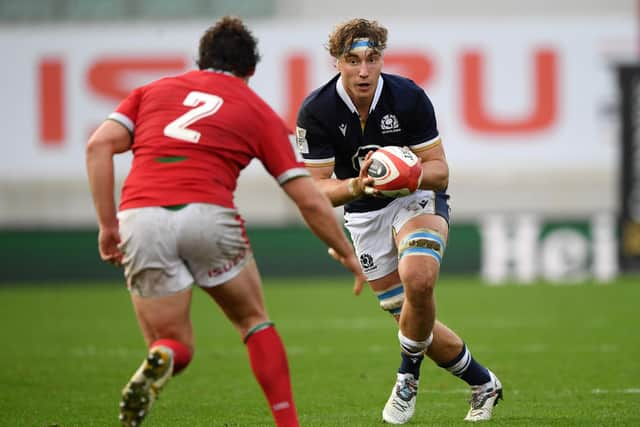Ali Price’s performance was a master-class in how to control and manage a game


In truth they secured the title thanks to their captain Owen Farrell’s decision to accept defeat in the last minutes of their match in Paris and kick a penalty goal to give them a losing bonus point. Well, Ireland’s Joey Carbery did something similar against Japan in the World Cup, in his case by kicking the ball out of play from deep in their 22 to protect a losing bonus point.
France played much of the best rugby in the tournament, certainly the most brilliant, though in no match did they put a complete 80 minutes together.
Advertisement
Hide AdAdvertisement
Hide AdIreland marked time at best, Wales slipped backwards, Italy, sadly, failed to rise. The tournament will be better when they have a stronger team.


For us, it was modestly satisfying: won three, lost two with neither defeat heavy. It was unfortunate that the games against England and Wales were played in vile conditions, the Calcutta Cup match truly appalling.
One pleasing feature has been improved defence, conceding an average of just over 10 points a match. On the other hand we scored fewer tries than in less successful seasons. Statistics always require qualification of course. The English and Welsh matches were played in conditions which made a feast of try-scoring unlikely, near impossible. We might of course have scored more tries if Finn Russell’s tournament hadn’t been limited to 30 minutes in Llanelli last week.
The forwards have been very good, especially in the set scrum and at the tackle-point where Jamie Ritchie and Hamish Watson have been outstanding, yielding first place to no opposition.
One might nostalgically prefer to see the set scrum being used to get quick ball to the backs at a time when the field is not too congested, but one has to accept that in the modern game it is seen as a means of achieving a moral ascendancy and winning penalties.
Well, Scotland have been doing that this year. Moreover we now have a replacement set of front row forwards capable of maintaining that ascendancy.
Too often in the past changes in the front row have seen the balance shift against us. No doubt the improvement owes much to the specialist coach Pieter de Villiers, born and bred in South Africa, experienced in the dark front-row world of the French Top 14.
If they have TV in heaven, our set scrum last Saturday would have had Bill Dickinson, that great scrum theorist and technician, Scotland’s first-ever coach, with a smile as big as a prop’s thigh splitting his face.
Advertisement
Hide AdAdvertisement
Hide AdMoreover, this is a young pack, only the hookers, Fraser Brown and Stuart McInally being on the wrong side of 30 – and both of them look good for a few seasons yet. Otherwise the average age is in the mid-20s. So there is scope for further improvement.There is competition for places, which is good, but the one position which still looks wide open is No 8.
No doubt Gregor Townsend will rotate his squad in the new Nations Cup over the coming weeks when there are four matches in quick succession.
Coaches are naturally eager to have strength in depth and therefore to give opportunities to players now on the fringe. On the other hand teams develop when there is consistency in selection. This is easier of course to practise when you are winning. So, in France, Fabien Galthie, unlike most of his predecessors, has made few changes this year, except when injuries have made change necessary.
In contrast, with Wales having now lost four internationals in a row, Wayne Pivac’s ears must be ringing with demands for change, Get rid of those whose best days are behind them, some call.
Jamie Ritchie was named last Saturday’s man of the match, and I can’t think many would argue with the choice. But the award might just as reasonably have gone to Ali Price. He didn’t play his natural game and some who have posted on HYS sites have complained that he was often very slow in passing – “as slow as Greig Laidlaw” indeed. But this was to miss the point.
The conditions determine how a match is played and, given also that it was always close on the scoreboard, the first thing was to avoid the sort of mistake which might see a dropped ball being hacked up field.
It was a day for prudent game-management. Laidlaw was the master of that, and Price, so often his deputy, took control of the game as Laidlaw used to do.
His excellent judgment of when to pass and who to pick out as receiver kept Scotland on the front foot and pinned Wales in their own half for the last quarter of the game, while a couple of dinky little kicks rolling into touch maintained the pressure.
On another day, with a dry ball and a fast pitch Price will play differently, but this was a master-class in how to control or manage a game.
Comments
Want to join the conversation? Please or to comment on this article.